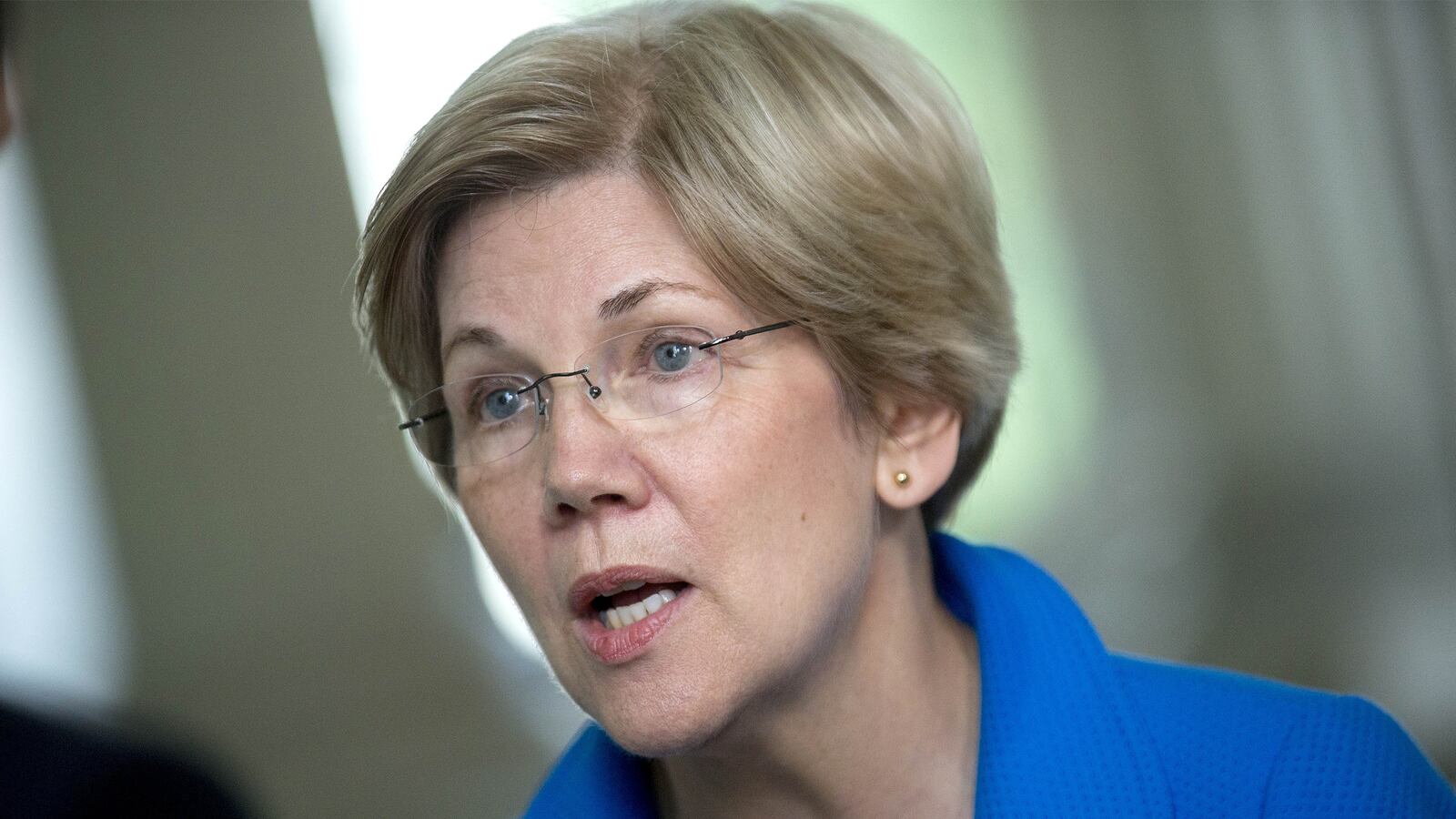OK, uber-liberal Elizabeth Warren is no Adam Smith. But when it comes to one issue and maybe one issue only, she comes closer to the famed free-market economist than do most of the bankers on Wall Street, Jamie Dimon included.
That issue involves the appropriate size and scope of the nation’s megabanks—JP Morgan, which Dimon runs, is the largest, but the other behemoths, Citigroup, Bank of America, and Wells Fargo, aren’t far behind in dimensions and most importantly risk.
Warren, the senator from Massachusetts and all-around big-bank hater, says these institutions should be broken up by the government out of fear that the system could implode as it did in 2008.
Dimon says the good senator should stick to making sure the Community Redevelopment Act is enforced and other pet lefty projects because she doesn’t “fully [understand] the global banking system.”
Pundits went nuts, accusing Dimon of “mansplaining” to Warren, which is silly because anyone who knows Jamie Dimon also knows that he mansplains to men all day long. What isn’t silly is that for once we have a leader in Washington, namely Warren, telling us what most of the political class and the bankers won’t: The banks are not free-market at all. They are big, government-protected entities that will be bailed out the next time a 2008 scenario comes around.
And the best way to make sure they don’t end up costing the taxpayers more money will be to make them smaller, which is about as close to a free-market statement as you might find on this subject, courtesy of Sen. Warren.
The dirty secret in Washington and Wall Street that Warren is exposing is that banks like JP Morgan, Citi, and B of A will always be on the government’s protected-species list because of a little thing known as deposit insurance, which covers bank deposits up to $250,000.
Sounds like a good thing, right? But here’s the nefarious side: These banks just don’t take in deposits and lend them out so people can buy homes and so on anymore. Thanks in large part to Hillary Clinton’s husband, banks combine these commercial banking activities with Wall Street risk-taking.
Meanwhile, JP Morgan has a whopping $1.4 trillion in deposits, which isn’t just sitting around in some vault (banks like to make money on your money). As a result, a massive screwup on its trading desk or some 2008-like event that leads to insolvency could mean the taxpayer is on the hook for a chunk of that money—a number, I might add, that could dwarf the $800 billion stimulus package President Obama blew through during the Great Recession.
My question: What free-marketer would allow the American taxpayer to subsidize Jamie Dimon’s risk-taking?
Again, the Dodd-Frank Act was supposed to get rid of Too Big to Fail, but the reality that Warren is at least honest about is that it hasn’t: Banks like JP Morgan are bigger and potentially at more risk than before the financial crisis because there are fewer of them holding more assets.
There are lots more regulations and capital requirements to contend with now, but if something unforeseen happens and a big bank fails, the credit markets will do what they almost did in 2008: Shut down. People won’t be able to use their credit cards and companies won’t be able to make payroll because both are funded through short-term borrowing.
In other words, no politician is going to let any of the big banks fail.
What’s great about the Warren vs. Dimon feud is that it both exposes Wall Street’s real crony capitalism roots and the hypocrisy of Hillary Clinton remaking herself in the Elizabeth Warren class-warrior mode. Yes it was Bill Clinton who enacted one of the least thought-out banking laws back in 1999 that made it legal to combine commercial-banking activities with Wall Street-style risk-taking.
The result of what was known as the Gramm-Leach-Bliley Financial Services Modernization Act was the permanent dismantling of the Glass-Steagall Act, which made it illegal to mix bond trading with deposit-taking. But the only thing modern about this monstrosity was that it gave future generations of taxpayers a new liability: the big banks.
The law paved the way for the creation of the financial supermarket known as Citigroup, which would go on to hire Clinton Treasury Secretary Robert Rubin as one of its top executives and board members. Citi initially made a lot of money, but it caused a lot of trouble: billions of dollars in regulatory fines, and then insane risk-taking that led to its near collapse and government bailout in 2008—all under Rubin’s nose.
Can’t wait to hear Hillary Clinton, who has collected hundreds of thousands of dollars in speaking fees from bankers, explain that one on the campaign trail.
She won’t of course, but Warren should be given credit for explaining just how protected and coddled banks still are in many ways, thanks to the Clintons and their unholy alliance with Wall Street. Dimon’s comments about Warren are shocking only because they were made honestly and publicly. As I have reported, Citigroup is so paranoid about what Warren is saying that it has a group of researchers doing daily surveillance on her bank-bashing comments.
I should point out Dimon and JP Morgan shouldn’t be placed in the Citigroup category; Dimon is a great banker and net-net JP Morgan is a very well-run bank (thanks to Dimon, it avoided the worst of the financial crisis’s risk-taking). But Dimon also believes bigger is better—he has told me foreign banks will dominate the global banking business if U.S. banks are forced to break up.
That might be the case, but so what? And why should taxpayers subsidize his paycheck, which goes up with every successful trade? My advice: If Jamie Dimon wants to roll the dice in the derivatives markets, he should first be forced to give up his access to FDIC insurance on JP Morgan’s deposits.
I’m pretty sure Adam Smith and Elizabeth Warren would agree.






